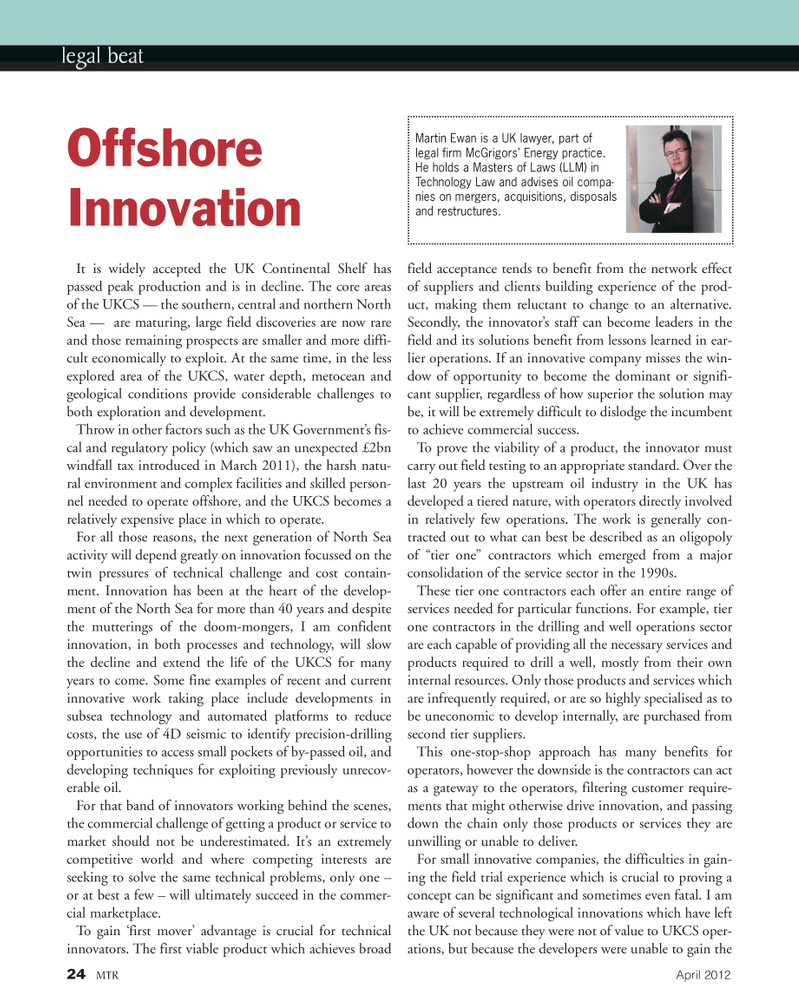
Page 24: of Marine Technology Magazine (April 2012)
Global Offshore Deepwater Report
Read this page in Pdf, Flash or Html5 edition of April 2012 Marine Technology Magazine
It is widely accepted the UK Continental Shelf has passed peak production and is in decline. The core areas of the UKCS ? the southern, central and northern North Sea ? are maturing, large field discoveries are now rare and those remaining prospects are smaller and more diffi- cult economically to exploit. At the same time, in the less explored area of the UKCS, water depth, metocean and geological conditions provide considerable challenges to both exploration and development. Throw in other factors such as the UK Governments fis- cal and regulatory policy (which saw an unexpected £2bn windfall tax introduced in March 2011), the harsh natu- ral environment and complex facilities and skilled person- nel needed to operate offshore, and the UKCS becomes a relatively expensive place in which to operate. For all those reasons, the next generation of North Sea activity will depend greatly on innovation focussed on the twin pressures of technical challenge and cost contain- ment. Innovation has been at the heart of the develop- ment of the North Sea for more than 40 years and despite the mutterings of the doom-mongers, I am confidentinnovation, in both processes and technology, will slow the decline and extend the life of the UKCS for many years to come. Some fine examples of recent and current innovative work taking place include developments in subsea technology and automated platforms to reduce costs, the use of 4D seismic to identify precision-drilling opportunities to access small pockets of by-passed oil, and developing techniques for exploiting previously unrecov- erable oil.For that band of innovators working behind the scenes, the commercial challenge of getting a product or service to market should not be underestimated. Its an extremely competitive world and where competing interests are seeking to solve the same technical problems, only one ? or at best a few ? will ultimately succeed in the commer- cial marketplace. To gain first mover advantage is crucial for technical innovators. The first viable product which achieves broad field acceptance tends to benefit from the network effect of suppliers and clients building experience of the prod- uct, making them reluctant to change to an alternative. Secondly, the innovators staff can become leaders in the field and its solutions benefit from lessons learned in ear- lier operations. If an innovative company misses the win- dow of opportunity to become the dominant or signifi- cant supplier, regardless of how superior the solution may be, it will be extremely difficult to dislodge the incumbent to achieve commercial success. To prove the viability of a product, the innovator must carry out field testing to an appropriate standard. Over the last 20 years the upstream oil industry in the UK has developed a tiered nature, with operators directly involved in relatively few operations. The work is generally con- tracted out to what can best be described as an oligopolyof tier one? contractors which emerged from a major consolidation of the service sector in the 1990s. These tier one contractors each offer an entire range of services needed for particular functions. For example, tier one contractors in the drilling and well operations sector are each capable of providing all the necessary services and products required to drill a well, mostly from their own internal resources. Only those products and services which are infrequently required, or are so highly specialised as to be uneconomic to develop internally, are purchased from second tier suppliers.This one-stop-shop approach has many benefits for operators, however the downside is the contractors can act as a gateway to the operators, filtering customer require- ments that might otherwise drive innovation, and passing down the chain only those products or services they are unwilling or unable to deliver. For small innovative companies, the difficulties in gain- ing the field trial experience which is crucial to proving a concept can be significant and sometimes even fatal. I am aware of several technological innovations which have left the UK not because they were not of value to UKCS oper- ations, but because the developers were unable to gain the legal beat Offshore InnovationMartin Ewan is a UK lawyer, part of legal firm McGrigors Energy practice. He holds a Masters of Laws (LLM) inTechnology Law and advises oil compa- nies on mergers, acquisitions, disposals and restructures. 24MTRApril 2012

 23
23

 25
25
